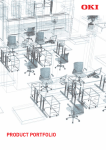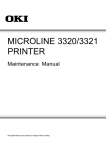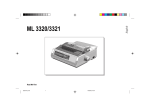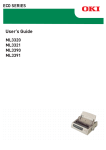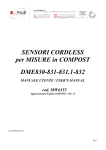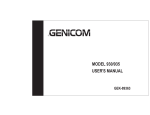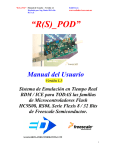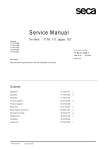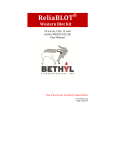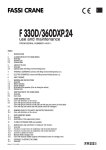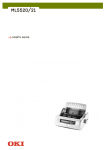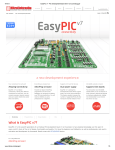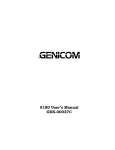Download User`s Guide
Transcript
English ML 3390/3391 SEL SEL MENU EXIT POWE R SHIFT ALARM LF Micro Feed Down GROU P FF/LOA D TEAR Micro Feed Up ITEM MENU PRINT PARK PRINT QUALI TY LQ UTILITY QUIET SET TOF CHAR ACTER 10 17 PITCH COUR IER GO PRESTI ROMAN THIC GE SWISSORATOR 12 20 15 PROP Help Guide 3390hlp1.pm6 1 22/03/96, 16:04 Every effort has been made to ensure that the information in this document is complete, accurate, and up-to-date. Oki assumes no responsibility for the results of errors beyond its control. Oki also cannot guarantee that changes in software and equipment made by other manufacturers and referred to in this guide will not affect the applicability of the information in it. Mention of software products manufactured by other companies does not necessarily constitute endorsement by Oki. Oki and Microline are registered trademarks of Oki Electric Industry Company, Ltd. Energy Star is a trademark of the United States Environmental Protection Agency. Epson is a registered trademark of Epson America, Inc. IBM is a registered trademark of International Business Machines Corp. © 1995 by Oki. All rights reserved. First edition January 1996. Written and produced by the Documentation Department. Energy Star As an Energy Star Partner, Oki has determined that this product meets the Energy Star guidelines for energy efficiency. 3390hlp1.pm6 2 22/03/96, 16:04 Your printer has been carefully designed to give you years of safe, reliable performance. As with all electrical equipment, there are a few basic precautions you should take to avoid hurting yourself or damaging the printer: • Read the setup and operating instructions carefully. Be sure to save them for future reference. • Read and follow all warning and instruction labels on the printer itself. • Unplug the printer before you clean it. Use only a damp cloth; do not use liquid or aerosol cleaners. • Place your printer on a firm, solid surface. If you put in on something unsteady, it might fall and be damaged; if you place it on a soft surface, such as a rug, sofa, or bed, the vents may be blocked, causing it to overheat. • To protect your printer from overheating, make sure no openings on the printer are blocked. Do not put the printer on or near a heat source, such as a radiator or heat register. If you put the printer in any kind of enclosure, make sure it is well ventilated. • The printhead can get quite hot when it has been printing for a length of time. Do not touch the printhead until it has had a chance to cool off. • Do not use your printer near water, or spill liquid of any kind into it. • Be certain that your power source matches the rating listed on the back of the printer. If you are not sure, check with your dealer or with your local power company. • Your printer has a earthed, 3-pin plug as a safety feature, and it will only fit into a earthed outlet. If you can not plug it in, chances are that you have an older, non-earthed outlet; contact an electrician to have it replaced with a earthed outlet. Do not use an adapter to defeat the earthing. • The outlet into which you plug your printer must remain easily accessible at all times. • To avoid damaging the power cable, do not put anything on it or place it where it will be walked on. If the cable becomes damaged or frayed, replace it immediately. • If you are using an extension cable or power strip with the printer, make sure that the total of the amperes required by all the equipment on the extension is less than the extension’s Help Guide 3390hlp2.pm6 i 1 22/03/96, 16:04 English Safety rating. Generally, the total ratings of all equipment plugged into any one power line should not exceed 13 amperes. Do not exceed this unless you know that the power line your equipment is plugged into has a rating above 13 amperes. Do not poke anything into the ventilation slots on the sides of the printer; you could get a shock or cause a fire. • Aside from the routine maintenance described in the manuals, don’t try to service the printer yourself; opening the cover may expose you to shocks or other hazards. Do not make any adjustments other than those outlined in the manual, you might cause damage requiring extensive repair work. • If anything happens that indicates that your printer is not working properly or has been damaged, unplug it immediately and contact your Oki dealer for service. These are some of the things to look for: English • • The power cable or plug is frayed or damaged. • Liquid has been spilled into the housing, or the printer has been exposed to water. • The printer has been dropped or its cabinet has been damaged. • The printer doesn’t function normally when you are following the operating instructions. ii 3390hlp2.pm6 ML3320/21 2 22/03/96, 16:04 Getting to Know Your Printer Carriage Cover Open Carriage Cover Paper Guides Access Cover Paper Separator Access Cover Paper Separator SEL SEL MENU EXIT POWER SHIFT ALARM LF Micro Feed Down GROUP FF/LOAD TEAR Micro Feed Up ITEM MENU SEL PARK SET PRINT PRINT QUIET TOF QUALIT Y LQ UTILITY SEL MENU COURI ER GO PRESTIGROMAN THIC CHARA E CTER SWISSORATOR PITC 10 H 12 17 15 20 EXIT POWER SHIFT ALARM LF Micro Feed Down GROUP FF/LOAD TEAR Micro Feed Up ITEM MENU PROP PARK SET PRINT PRINT QUA QUIET TOF LITY LQ UTILITY CHA RAC TER PITC 10 H 17 COURIE R GO PRESTIGROMAN THIC E SWISSORATOR 12 20 15 PROP Control Panel On-Off Switch Control Panel On-Off Switch Paper Lever Platen Knob Set up for Rear Feed of Continuous Forms Paper Lever Set up for Single-Sheet Feed 2 3390rmf3.pm6 Platen Knob ML3390/91 2 22/03/96, 16:02 Loading Paper Loading Continuous Forms (Rear Feed) We recommend the rear-feed path for printing reports, etc., on single-thickness, continuous-form paper. For graphics or charts, it's best to use the single-sheet path (top feed). Note: If you have paper in the paper path, be sure to remove it before installing rear-feed paper. Tractor Terms Lock Lever Tractor Cover Pins 1. Move the paper lever to the position marked “REAR.” 3. Pull up on the lock levers and open the tractor covers. 2. Grasp the paper separator, lift it slightly, pull back on it, then swing it forward. 4. Move the right tractor over to fit the width of the paper. D TEAR d PRIN PARK T QUA QUIE SET U PRINT LITY HSD T TOF UTL NLQ SSD CHA RAC TER PITC H 10 17 12 20 15 PROP LF Micro Feed Down GR FF/LOAD Micro Feed U TEAR P PRIN 6 3320rmf3.pm6 ML3320/21 6 13/03/96, 16:07 7. Adjust the right tractor to centre the paper holes on the pins, and push back the lock lever. 8. Lower the paper separator and place the wire guide (➊) on the pull-up roller assembly (➋). ➊ ➋ 6. Move the left tractor to align the edge of the paper with the appropriate reference mark (➊), and push back the lock lever. ➊ 9. Press FF/LOAD. The paper feeds into the printer. Note: The standard setting for the Top of Form (where the printing begins) is 2.54cm down from the top of the page. To change the setting, see page 9. Read Me First 3320rmf3.pm6 7 7 13/03/96, 16:08 English 5. Place the first two holes in the paper over the tractor pins on either side and close the tractor covers. Loading Single Sheets (Top Feed) 3. Open the carriage cover and lift the paper separator to the single-sheet position. Use the single-sheet path for letterhead stationery, memos, and individual envelopes. It is recommended for printing graphs and charts because it provides the most accurate control of the paper. Note: If you have continuous-form paper in the path, press the PARK button to remove it before loading single sheets. 1. Make sure the printer is on and deselected (SEL light off). SEL SEL MENU EXIT POW ER SHIFT LF Micro Feed Down ALAR M GROUP FF/LO AD Micro Feed Up TEAR MENU PRIN PARK ITEM SET T QUA LITY HSD QUIET PRINT TOF UTL NLQ CHA SSD RACTER PITC 10 H 12 17 15 20 PROP 4. Make sure the wire feed guide (➊) is in the paper separator. 2. Place the paper lever in the position marked “TOP.” ➊ SEL SEL MENU EXIT POW ER SHIFT LF Micro Feed Down ALAR M GROUP FF/LO AD Micro Feed Up TEAR MENU PRIN PARK ITEM SET T QUA LITY HSD QUIET PRINT TOF UTL NLQ CHA SSD RACTER PITC 10 H 17 12 20 15 PROP 8 3320rmf3.pm6 ML3320/21 8 13/03/96, 16:08 Setting the Top of Form (TOF) When setting the Top of Form, use the red line (➊) on the paper shield as a reference: ➊ ➊ M PARK PRINT QU ALITY HSD QUIET UTL 1. Make sure the printer is deselected (SEL light off). SEL SEL MENU EXIT POWE R SHIFT ALARM LF Micro Feed Down GROU P FF/LOA D TEAR Micro Feed Up ITEM MENU PARK SET PRINT PRINT QUALI TY HSD QUIET TOF UTL NLQ CHARA CTER 10 17 SSD PITC H 12 20 15 PROP 2. Press and hold SHIFT (➊), then: ☛ Press LF (➋) to move Top of Form higher on page ☛ Press FF/LOAD (➌) to move Top of Form lower on page ➊ ➋ ➌ LF FF/LOAD SHIFT Micro Feed Down Micro Feed Up GROUP ITEM SEL SEL Note: The standard setting for the Top of Form (where the printing begins) is 2.54cm down from the top of the page. To change the setting, see the next column. MENU EXIT POWER ALARM Read Me First 3320rmf3.pm6 TEAR PARK SET PRINT QUIET TOF MENU 9 9 13/03/96, 16:08 English 5. Adjust the paper feed guides (➊) for the width of the paper and place a sheet of paper in the separator. The paper will feed into the printer. 3. Press SEL to re-select the printer. SEL Resetting the Top of Form to the Standard Setting 1. Turn the printer off. SEL MENU EX T 2. Hold PARK + QUIET/TOF while turning the printer back on. Temporarily Changing the Top of Form Setting To set the Top of Form position lower for one page only: SEL 1. Press SEL to deselect the printer. SEL MENU SEL SEL EXIT POWER SHIFT LF FF/LOAD Micro Feed Down Micro Feed Up GROUP ITEM ALARM TEAR PARK SET PRINT QUIET TOF MENU MENU EX T 2. Press LF to change the position of the Top of Form. LF Micro Feed Down GROUP Note: This setting will not apply to any following pages. 10 3320rmf3.pm6 ML3320/21 10 13/03/96, 16:08 Setting the Printhead Gap To switch from continuous-forms to single-sheet feed: The printhead gap is the distance between the printhead and the platen. To adjust the gap, open the access cover and move the blue lever (➊) to the recommended setting from the table below. 1. 2. 3. 4. 5. 6. Tear off any printed pages. Press PARK. Move the paper separator to the single-sheet feed position. Place the wire feed guide in the paper separator. Note: It is recommended that the printer be switched off Move the paper lever to the position marked “TOP.” prior to removing the access cover. Place a sheet of paper in the paper separator. To switch from single-sheet feed to continuous forms: 1. Press FF/LOAD to remove the single-sheet paper. 2. Lower the paper separator into the continuous-forms position and swing the wire feed guide over onto the pull-up roller. 3. Move the paper lever to the position marked “REAR” or “BOT,” as appropriate. 4. Load continuous-form paper, then press FF/LOAD. ➊ Media 45-75g/m² paper Setting Media 1 2-part form (w/carbon) 75-90g/m² bond paper 2 3-part form (w/carbon) 4-5 Labels 3-4 4-part form (w/carbon) 5 Envelopes 5 Read Me First 3320rmf3.pm6 Setting 3-4 11 11 13/03/96, 16:08 English Switching Paper Paths Running the Self Tests Selecting an Emulation Font Sample Test Your printer has three emulations: • Epson® FX • IBM® Proprinter III • MICROLINE® Standard To run the test: Turn the printer off, then press and hold LF while turning the printer on. LF Micro Feed Down The printer comes set for the IBM Proprinter III emulation. To change to one of the other emulations: GROUP 1. Make sure paper is loaded. To stop the test: If you wish to stop the test before it is complete, press SEL. 3. Press SHIFT + SEL: the printer will enter the Menu Mode. ASCII Test To run the test: 2. Deselect the printer (SEL light off, press SEL key). Turn the printer off, then press and hold QUIET while turning the printer on. SEL QUIET TOF To stop the test: SEL MENU EXIT POWER SHIFT LF FF/LOAD Micro Feed Down Micro Feed Up GROUP ITEM ALARM PARK SET PRINT QUIET TOF MENU Press SEL. 12 3320rmf3.pm6 TEAR ML3320/21 12 13/03/96, 16:08 LF Micro Feed Down GROUP The following line will print: Printer Control Emulation Mode IBM PPR 5. Press TEAR consecutively until the emulation you wish to select prints in the right-hand column. SET NU 6. Press SHIFT + SEL to save your setting and exit the Menu Mode. SEL SEL EXIT POWER SHIFT LF FF/LOAD Micro Feed Down Micro Feed Up GROUP ITEM ALARM Important! See your software documentation for information on how to select a printer driver. Printer Drivers TEAR MENU Before you can use your printer with software, you must enter the software and select the correct printer driver. If you have the wrong driver selected, you will see strange characters, incorrect fonts, etc. MENU TEAR PARK SET PRINT QUIET TOF The drivers below are listed by decreasing compatibility with your printer: use one as close to the top of the list as possible. IBM Proprinter III Epson FX Microline Standard ML3320/1 IBM IBM Proprinter III IBM Proprinter II IBM Proprinter IBM Graphics Printer ML3320/1 Epson Epson FX286e Epson FX 850/1050 Epson FX 86/286 Epson FX Epson FX800/1000 Microline Microline Microline Microline Microline Microline Read Me First 3320rmf3.pm6 320/321 320/321 320/321 292/293 192/193 182/183 13 13 13/03/96, 16:09 English Selecting a Printer Driver 4. Press LF. English Maintenance 3. Remove and discard the used ribbon cartridge. Replacing the Ribbon Cartridge Note: For the best results, use genuine Oki ribbons. 1. Make sure the printer is turned OFF. 2. Centre the printhead (➊). Caution! The printhead may be HOT! ➊ 4. Unpack the new ribbon cartridge. Help Guide 3390hlp3.pm6 1 1 22/03/96, 16:04 5. Install the new ribbon cartridge. Clearing Paper Jams Rear-Feed Jams 1. Turn the printer OFF and use the platen knob to back the paper all the way out. A 6. Turn the knob (➊) in the direction of the arrow to take up any ribbon slack. 2. Open the access cover, and remove the pull-up roller assembly. ➊ 2 3390hlp3.pm6 ML3390/91 2 22/03/96, 16:05 English 3. Remove any torn pieces of paper. 6. Turn the printer on. 4. Replace the pull-up roller assembly, and close the access cover. 7. Press FF/LOAD. 5. Reload paper. FF/LOAD Micro Feed Up ITEM MN Help Guide 3390hlp3.pm6 3 3 22/03/96, 16:05 Correcting Repetitive Rear-Feed Jams If the paper keeps jamming, you probably have bits of paper stuck in the paper path. 3. Fold some continuous-form paper over three times to make a page four sheets thick, load it on the tractors and close the covers. 1. Perform steps 1 through 3 under “Rear-Feed Jams.” 2. Grasp the paper separator (➊), lift it slightly, pull back on it, then swing it forward. ➊ 4. Swing the paper separator over, and use the platen knob to draw the quadruple-thick page around the platen: this brings out any jammed bits of paper. SEL SEL MENU EXIT POWE R SHIFT ALARM LF Micro Feed Down GROU P FF/LOAD Micro Feed Up TEAR ITEM MENU SET PARK PRINT QUIET PRINT QUALI TY HSD TOF UTL NLQ SSD CHARA CTER PITCH 10 12 17 20 15 PROP AD TEAR ed PRIN PARK T QUA LITY HSD QUIE T SET NU PRINT TOF UTL NLQ SSD CHA RAC TER PITC 10 H 17 12 20 15 PROP 4 3390hlp3.pm6 ML3390/91 4 22/03/96, 16:05 FF/LO AD TEAR Micro Feed Up MENU PRIN PARK ITEM T QUA QUIE SET PRINT LITY HSD T TOF UTL NLQ SSD CHA RAC TER PITC 10 H 17 12 20 15 PROP 8. Turn the printer on. 6. Swing the paper separator over, reload regular paper, and lower the paper separator back into place. 9. Press FF/LOAD. FF/LOAD Micro Feed Up ITEM Help Guide 3390hlp3.pm6 5 5 22/03/96, 16:05 English 5. Remove the paper pieces, and use the platen knob to back 7. Replace the pull-up roller assembly, and close the access the paper out. cover. Single-Sheet Jams 1. Turn the printer off. 4. Remove any torn pieces from around the carriage. 2. Use the platen knob to back the jammed paper out. 5. Reinstall the pull-up roller assembly, and close the access cover. SEL SEL MENU EXIT POWER SHIFT LF Micro Feed Down ALAR M GROUP FF/LO AD TEAR Micro Feed Up MENU PRINT PARK ITEM QUIE T SET PRINT TOF QUA LITY HSD UTL NLQ SSD CHAR ACTE R PITCH 10 17 12 20 15 PROP 3. Open the access cover and remove the pull-up roller assembly. 6. Turn the printer on, and reload paper. SEL SEL MENU EXIT POWER SHIFT LF Micro Feed Down ALAR M GROUP FF/LO AD TEAR Micro Feed Up MENU PRINT PARK ITEM QUA LITY LQ UTILIT Y QUIE T SET PRINT TOF CHA RAC TER PITCH 10 17 COU RIER GOTH PREST ROMAN IC IGE SWISORATOR S 12 20 15 PROP 6 3390hlp3.pm6 ML3390/91 6 22/03/96, 16:05 You should clean the printer every six months (or after about 300 hours of operation). 4. Reinstall the pull-up roller assembly, and close the access cover. Note: Never use solvents or strong detergents on the cabinet: they could damage the housing. 1. Turn the printer off, and remove any paper from the path. 2. Open the access cover, remove the pull-up roller assembly. 3. Use a clean, dry cloth to dust around the carriage shaft and platen. Remove any loose pieces of paper. Help Guide 3390hlp3.pm6 7 7 22/03/96, 16:05 English Cleaning the Housing Troubleshooting Problem: Nothing happens when I turn on the printer. Solution: Check the power cable connection the outlet and to your printer. If you are using a power strip, make sure it is turned on, and that the fuse has not blown nor the circuit breaker tripped. Problem: I'm getting strange symbols, incorrect fonts, etc., when I try to print a document. Solution: (1) Problem: The printer does not print when data is sent. Solutions: (1) Is the SEL light on? If not, press the SEL key. (2) Check that the interface cable is securely connected to both the computer and the printer. (3) If you have the optional serial interface board installed, check to be sure that it is firmly seated in the printer. (2) Check to be sure that the printer driver you have selected in your software matches the printer emulation. (Press SHIFT and SEL keys, then press GROUP key: this will print a line showing the emulation you have selected.) If you have embedded any printer commands in your software, check to be sure that you entered them correctly. Problem: I've installed a new ribbon and the printing is smeared and streaked. Solution: The ribbon shield is either loose or missing. Remove the ribbon cartridge and check the clear plastic ribbon shield: if it's loose, secure it in place, if it is missing, find it and reinstall it. 8 3390hlp3.pm6 ML3390/91 8 22/03/96, 16:05 Problem: My word processor files don't print the way I have the menu and front panel set. Solution: This indicates a paper jam. Press the SEL key Solution: Before sending a file to the printer, many word and correct the paper jam situation ( see “Clearing processors send either an “initialization string” Paper Jams” in this manual). or an I-Prime signal to the printer. Problem: The ALARM light is on and the Character Pitch 10 light is flashing. Solution: This indicates that the paper lever is set at the wrong position for the paper you are trying to use: move it to the proper setting. Problem: The ALARM light is blinking. Solution: Try turning the printer off and then back on again. If the light still blinks, call for service. Problem: The printer needs paper, but the ALARM light is not on and I can't load the paper. The initialization string contains codes that override the panel and menu settings. To change your printer to ignore the reset code, enter the Menu Mode, go down to the Set-Up group and change the setting for Reset Inhibit to Yes (see “Changing the Menu Settings” in this manual). The I-Prime signal will automatically override any front panel settings you have made. To eliminate this problem, enter the Menu Mode, go down to the Parallel Interface group and change the setting for I Prime to Invalid (see “Changing the Menu Settings” in this manual). Solution: Press and release the SEL key, then hold the SHIFT key and press the RESET (CHARACTER PITCH) key: this resets the printer. Help Guide 3390hlp3.pm6 9 9 22/03/96, 16:05 English Problem: The ALARM light is on and the Character Pitch 15 light is flashing. Problem: The Print Quality and Character Pitch keys on the front panel won't work. Solution: The Operator Panel Function in the printer menu can be used to disable these buttons. If the printer is part of a customized system or if it is used by a number of people, the system manager may have used this option to make sure the printer is always set properly. Problem: Continuous-form paper is sticking to the paper separator. Solution: In cold dry weather, static charges can build up and make the paper cling to the paper separator. Try moving the paper guides together so that the paper rests on the guides rather than on the separator. Problem: Ink smears on paper. Solution: This may be caused by excessive printhead travel from the centring position when printing narrow columns. Set Centring Position to MODE 1. On ML3391 also try MODE 2. (See Menu Mode). 10 3390hlp3.pm6 ML3390/91 10 22/03/96, 16:05 English Using Your Printer Print Mode: Indicator Lights ➍ ➋ ➊ PRINT QUALITY LQ SEL SEL MENU EXIT POWER SHIFT LF FF/LOAD Micro Feed Down Micro Feed Up GROUP ITEM ALARM TEAR PARK QUIET TOF SET MENU PRINT UTILITY CHARACTER PITCH 10 17 ➎ ➌ ➊ SEL .............. Glows = printer selected, ready to receive data Flashes = printer in Print Suppress Mode Not lit = printer deselected (can't receive data) ➋ QUIET ......... Glows = printer in Quiet state. ➌ POWER ....... Glows = printer turned on. ➍ PRINT QUALITY ..... Indicate print quality and font selected. COURIER GOTHIC ROMAN PRESTIGE ORATOR SWISS 12 15 20 PROP ➏ ➎ ALARM ... Glows = error condition exists: ➤ out of paper if no other lights are blinking ➤ paper jam if 15 cpi light is also blinking ➤ paper lever is set to wrong position if 10 cpi light is also blinking. Blinks = error condition. Turn printer off, then on; if the light still flashes, contact your service dealer. ➏ 10/12/15/17/20/PROP ..... Indicate character pitch selected. Help Guide 3390hlp3.pm6 11 11 22/03/96, 16:05 Print Mode: Control Panel Keys ➍ ➋ ➊ ➎ ➌ PRINT QUALITY LQ SEL LF FF/LOAD Micro Feed Down Micro Feed Up GROUP ITEM SEL MENU EXIT POWER SHIFT ALARM TEAR PARK SET PRINT UTILITY QUIET TOF CHARACTER PITCH 10 17 MENU ➏ ➐ ➊ SEL ......... Selects/deselects printer. When held on power up, engages the Menu Mode. ➋ SHIFT ..... Press and hold while pressing another switch to engage the alternate function for that switch (e.g. “Micro Feed Down” for the LF key). ➌ LF ............ Moves paper up one line: press and hold for repetitive line feeds. When held on power up, activates the Font Test. ➍ QUIET .... Turns Quiet Mode on and off. When held on power up, activates the Rolling ASCII Test. ➑ 12 15 20 PROP ➒ ➎ PRINT QUALITY ........... Selects the print quality and font. ➏ FF/LOAD ......................... Loads/ejects single sheet of paper; moves continuous-form paper to print position. ➐ TEAR ................................ Moves continuous-form paper up for tear-off or back down for printing. ➑ PARK ................................ Retracts continuous-form paper from the path. ➒ CHARACTER PITCH .... Selects the character pitch. Used with the SHIFT key to reset the printer. 12 3390hlp3.pm6 COURIER GOTHIC ROMAN PRESTIGE ORATOR SWISS ML3390/91 12 22/03/96, 16:05 Important! Front panel settings for print quality and When Letter Quality is engaged, the lights indicate which character pitch can be overridden by software font is selected: commands. The lights will always reflect the printer's state. PRINT QUALITY LQ Press PRINT QUALITY to select: UTILITY COURIER GOTHIC ROMAN PRESTIGE ORATOR SWISS LQ: Letter Quality • • • Highest quality, slowest speed Seven fonts Recommended for correspondence UTILITY: • • • Medium quality, medium speed Gothic font only Recommended for internal documents and high-volume data. • • • • • • • Courier: LQ and Courier lights on Gothic: LQ and Gothic lights on Orator: LQ and Orator lights on Prestige: LQ and Prestige lights on Roman: LQ, Courier and Gothic lights on Swiss: LQ, Orator and Prestige lights on Swiss Bold: LQ light on Note: To select High Speed Draft mode, set the Print Quality to UTILITY and the Character Pitch to 15. Help Guide 3390hlp3.pm6 13 13 22/03/96, 16:05 English Selecting the Print Quality and Font Selecting the Character Pitch Menu Mode: Control Panel ➌ ➋ ➊ Press CHARACTER PITCH to select the width of characters in characters per inch: ➍ SEL 10 cpi • Recommended for standard text. 12 cpi • Yields more text per page. • Recommended for standard text. 15 cpi • In HSD mode, yields fastest printing. • Recommended for large volumes of data. 17.1 cpi, 20 cpi • Smallest print • Recommended for spreadsheets. PROP • Proportional spacing • Recommended for documents where you want a more polished appearance. • Not available for High Speed Draft. LF FF/LOAD Micro Feed Down Micro Feed Up GROUP ITEM SEL MENU EXIT POWER SHIFT ALARM PARK SET PRINT QUIET TOF MENU ➎ ➊ GROUP key ..Prints the next Group in the Menu. With the SHIFT key, prints the previous Group. ➋ ITEM key .....Prints the next Item in the Group. With the SHIFT key, prints the previous Item in the Group. ➌ SET key ........Prints the next Setting for an Item. With the SHIFT key, prints the previous Setting for an Item. ➍ PRINT key ... Prints a copy of all the Menu settings. With the SHIFT key, prints the current settings for the Group selected. ➎ MENU light ..Glows when the printer is in the Menu Mode. 14 3390hlp3.pm6 TEAR ML3390/91 14 22/03/96, 16:05 Changing the Menu Settings To enter or exit the Menu Mode, hold SHIFT while pressing SEL. 1. Press SHIFT + SEL to enter the Menu Mode. Resetting the Menu To reset the Menu to the standard settings: 1. Turn the printer off. 2. Press SEL + LF while turning the printer on. Printing the Menu Settings 1. Make sure paper is loaded in the printer. 2. Enter the Menu Mode (SHIFT + SEL). 3. Press PRINT (PARK). Note: To print out a listing of the settings for all menu items, regardless of the emulation selected or the accessories installed, enter the Menu Mode, then press SHIFT + PRINT QUALITY. 2. Use the GROUP, ITEM and SET keys to make your changes: ➤ Press GROUP successively until the Group you wish to change appears in the first column. ➤ Press ITEM until the Item you wish to change appears in the second column. ➤ Press SET until the setting you want appears in the third column. 3. Press SHIFT + SEL to exit the Menu Mode and save your settings. Important! If you turn the printer off without first exiting the Menu Mode, the changes you have made will be lost. Help Guide 3390hlp3.pm6 English Entering and Exiting the Menu Mode 15 15 22/03/96, 16:05 Summary of Menu Settings The table below shows the items which may appear in the menu. Settings which are engaged at the factory (defaults) are set in bold italic. Some groups or entries will only appear when a specific emulation is engaged, as noted. Group Item Setting Printer Control Emulation Mode EPSON LQ, IBM PPR, IBM AGM Font Print Mode LQ Courier, LQ Roman, LQ Swiss, LQ Swiss Bold, LQ Orator, LQ Gothic, LQ Prestige, Utility 10 cpi, 12 cpi, 15 cpi, 17.1 cpi, 20 cpi No, Yes Normal, Italics Single, Double Pitch Proportional Spacing Style Size Symbol Sets Character Set Language Set Zero Character Code Page Slashed Letter O Set I, Set II ASCII, French, German, British, Danish I, Swedish I, Italian, Spanish I, Japanese, Norwegian, Danish II, Spanish II, Latin American, French Canadian, Dutch, Swedish II, Swedish III, Swedish IV, Turkish, Swiss I, Swiss II, Publisher Slashed, Unslashed USA, Serbo Croatic II, Canada French, ECMA-94, Multilingual, Windows East Europe, Portugal, Windows Greek, Norway, Latin 5 (Windows Turkey), Baltic 774, Windows Cyrillic, East Europe Latin II-852, Cyrillic I-855, Hungarian CWI, Turkey 857, Ukrainian, Cyrillic II-866, ISO Latin 6, Greek_869, Hebrew NC (862), Kamenicky (MJK), Hebrew OC, Greek_437, Windows Hebrew, Greek_437 CYPRUS, Windows Baltic, Turkey, Bulgarian, Polska Mazovia, Greek_928, ISO Latin 2, Serbo Croatic I No, Yes 16 3390hlp3.pm6 ML3390/91 16 22/03/96, 16:05 Item Settings Rear Feed Line Spacing Form Tear-Off Skip Over Perforation Page Width (ML 3391 only) Page Length 6 LPI, 8 LPI Off, 500 mS, 1 sec, 2 sec No, Yes 13.6", 8" 11", 11-2/3", 12", 14", 17", 3", 3.5", 4", 5.5", 6", 7", 8", 8.5" Bottom Feed Line Spacing Form Tear-Off Skip Over Perforation Page Width (ML 3391 only) Page Length 6 LPI, 8 LPI Off, 500 mS, 1 sec, 2 sec No, Yes 13.6", 8" 11", 11-2/3", 12", 14", 17", 3", 3.5", 4", 5.5", 6", 7", 8", 8.5" Top Feed Line Spacing Bottom Margin Page Width (ML 3391 only) Page Length Wait Time Page Length Control 6 LPI, 8 LPI Valid, Invalid 13.6", 8" 11", 11-2/3", 12", 14", 16.57", 3", 3.5", 4", 5.5", 6", 7", 8", 8.5" 500 mS, 1 sec, 2 sec by MENU Setting, by Actual Page Length Set-Up Graphics Receive Buffer Size Paper Out Override Print Registration Bidirectional, Unidirectional 23K, 1 Line, 8K No, Yes 0.25 mm Right, 0.20 mm Right, 0.15 mm Right, 0.10 mm Right, 0.05 mm Right, 0, 0.05 mm Left, 0.10 mm Left, 0.15 mm Left, 0.20 mm Left, 0.25 mm Left Help Guide 3390hlp3.pm6 English Group 17 17 22/03/96, 16:05 Group Item Settings Set-Up (continued) Operator Panel Function Reset Inhibit Print Suppress Effective Auto LF Auto CR* SI Select Pitch (10 cpi)* SI Select Pitch (12 cpi)* Time Out Print Auto Select Graphics Speed Centring Position Full Operation, Limited Operation No, Yes Yes, No No, Yes No, Yes 17.1 cpi, 15 cpi 20 cpi, 12 cpi Valid, Invalid No, Yes Low, High DEFAULT, MODE1, MODE2** Parallel I/F I-Prime Pin 18 Buffer Print, Invalid, Buffer Clear +5V, Open Auto Feed XT*** Invalid, Valid * ** *** Appears only when the IBM emulation is selected. ML3391 only. Applies only when the Epson emulation is selected. 18 3390hlp3.pm6 ML3390/91 18 22/03/96, 16:05 English Explanations of Menu Items Auto CR (IBM). If you want the printer to automatically add a carriage return when a Line Feed is received at the end of a line, change the setting to Yes. Emulation Mode. Choose the printer emulation. Form Tear-Off. Choose 500 mS, 1 sec, or 2 sec to turn the Form Tear-Off feature on and to set the time interval for the Auto LF. If your printout is consistently double spaced, select printer to wait before advancing the paper. No; if it overprints, select Yes. Graphics. Change to bidirectional graphics for faster printing: Auto Feed XT (Epson). If your system uses pin 14 of the optimise the registration using the Print Registration menu parallel interface to control automatic line feed, change the item. setting to Valid. I-Prime. Determines what the printer will do when it receives Auto Select. If you always use the same Top of Form position, the I-Prime signal from the host: Buffer Print prints out the change the setting to Yes. buffer contents before resetting; Buffer Clear dumps the buffer contents immediately. Invalid causes the printer to ignore the Bottom Margin. Change to Invalid if you want the printer to I-Prime signal. ignore the bottom margin setting. Caution! This can cause loss of data and damage the printhead. Language Set. Replaces certain standard symbols with special characters used in foreign languages. Centring Position. Choose DEFAULT, Mode 1 or Mode 2. Line Spacing. Change to 8 lpi to get more lines on a page. Character Set. Choose IBM Set I or IBM Set II. Operator Panel Function. Change to Limited Operation to Code Page. Choose the Code Page character set you wish to deactivate the PRINT QUALITY and CHARACTER PITCH use. buttons. This prevents these from being changed via the control panel when several people are using the printer. Help Guide 3390hlp3.pm6 19 19 22/03/96, 16:05 Page Length. Set this to match the length of the paper you are using. Print Suppress Effective. If your system uses the DC1 and DC3 codes for something other than the print suppress mode, change the setting to No. Page Length Control. Change the setting to “by Actual Page Length” if you wish to print on single-sheet pages.When “by Proportional Spacing. Change the setting to Yes to engage Actual Page Length” is selected, the printer will print no closer proportional spacing of characters. than 1" from the edge of the paper. When “by Menu Setting” Receive Buffer Size. Sets the amount of memory for holding is selected, the printer will print to the length you have chosen. received data. Choosing 1 Line will tie up your computer Page Width (ML 3391 only). Change to 8" to print on while printing, but the printer stops much sooner if you abort the job. letter-size paper. Paper Out Override. Senses when less than 1" (25 mm) of paper remains, and stops printing. Change to Yes to override the sensor. Caution! This can cause loss of data and damage the printhead! Pin 18. Sets the signal on pin 18 to +5 volts or to open. Reset Inhibit. Select Yes to prevent your software from resetting your printer's settings. SI Select Pitch, 10 cpi (IBM). Sets the pitch to be engaged when the printer control panel is set for 10 cpi and the SI command is received. Pitch. Choose the character width, in character per inch (cpi). SI Select Pitch, 12 cpi (IBM). Sets the pitch to be engaged when the printer control panel is set for 12 cpi and the SI Print Mode. Choose the quality and font for printing. command is received. Print Registration. Change the setting as required to obtain Size. Change to Double for double width and height printing. the best registration for bidirectional printing. 20 3390hlp3.pm6 ML3390/91 20 22/03/96, 16:05 Slashed Letter O. If set toYes, capital and lower case slashed O (Ø and ø) will appear at locations 9Bh and 9Dh respectively in USA code page. If set to No, the characters “¢” and “¥” will appear at these locations. Using the Printer's Features ➊ Tear Feature SEL LF FF/LOAD Micro Feed Down Micro Feed Up GROUP ITEM SEL MENU EXIT POWER SHIFT ALARM TEAR PARK SET PRINT QUIET TOF MENU Style. Change to italics if you want the printed characters to be slanted. Time Out Print. If your software spends a long time processing between portions of data it feeds to the printer, change the setting to Invalid to keep your printer from inadvertently dumping the received data while it is waiting for more. Wait Time. Sets the amount of time the printer will wait for more data before moving to the form tear-off position. Use this feature to advance continuous-form paper up to the tear position by simply pressing TEAR (➊). Note: The Tear Feature can not be used when the optional pull tractor is engaged. Forms Tear-Off Feature Important! Never engage Forms Tear-Off when printing on labels! Zero Character. If you do not want the printer to use a slash to distinguish the number zero from the capital letter O, change The Forms Tear-Off feature automatically moves continuous-form paper up to the tear position after the interval the setting to Unslashed. you select, then moves it back down again for printing when the printer receives more data. Help Guide 3390hlp3.pm6 21 21 22/03/96, 16:05 English Skip Over Perforation. Change to Yes if you want the printer to go to the next page when it comes within 1" (25 mm) of the bottom of the page. Keep it set to No if your software has its own page formatting controls. This feature is normally turned off. To activate it: ➊ ➌ ➋ ➍ SEL SEL MENU EXIT POWER SHIFT LF FF/LOAD Micro Feed Down Micro Feed Up GROUP ITEM ALARM TEAR PARK SET PRINT QUIET Note: Some programs pause occasionally while sending data. If the pause is too long, the paper will advance to the tear-off position until more data is received. This extra paper movement can cause uneven print registration in graphics. If you have this problem, use the menu to turn off this feature. TOF MENU Paper Park Feature ➊ 1. Press SHIFT (➋) + SEL (➊). SEL 2. Press GROUP (➌) until one of the following lines appears, depending on which paper feed you are using: REAR FEED Form Tear-Off OFF BOTTOM FEED Form Tear-OFF OFF SEL SHIFT MENU EXIT POWER ALARM LF FF/LOAD Micro Feed Down Micro Feed Up GROUP ITEM TEAR PARK SET PRINT QUIET TOF MENU To retract rear-feed paper form the paper path, press PARK (➊). 3. Press SET (➍) consecutively until the time interval you wish to select appears in the third column. 4. Press SHIFT (➋) + SEL (➊) to exit Menu Mode and save the setting. 22 3390hlp3.pm6 ML3390/91 22 22/03/96, 16:05 English Specifications Print Method Impact dot matrix Printhead 24 pins, 0.20 mm diameter, thermal protection Characters per Line (CPL) Setting Print Speed Mode Pitch, Characters per Inch Speed, Characters per Second High Speed Draft 15 cpi 390 cps Utility 10 cpi 12 cpi 17.1 cpi 20 cpi 260 cps 312 cps 223 cps 260 cps 10 cpi 12 cpi 15 cpi 17.1 cpi 20 cpi 87 cps 104 cps 130 cps 149 cps 174 cps Letter Quality ML 3390 10 cpi 80 cpl 136 cpl 12 cpi 96 cpl 163 cpl 15 cpi 120 cpl 204 cpl 17.1 cpi 137 cpl 233 cpl 20 cpi 160 cpl 272 cpl Emulations Epson LQ, IBM Proprinter, IBM AGM co-resident Interface Standard: Centronics parallel Optional: RS-232C serial Graphics Resolution 360 x 360 dpi maximum Receive Buffer Size 23K DLL RAM 15K maximum (Epson emulation only) Help Guide 3390hlp3.pm6 ML 3391 23 23 22/03/96, 16:05 Resident Fonts Print Modes Bar Codes Mode Character Pitch Mode/Font Size Letter Quality 10, 12, 15, 17.1, or 20 cpi, or Proportional LQ Courier 10 cpi, 12 cpi, Superscript/subscript LQ Roman 10 cpi, 12 cpi, Superscript/subscript Utility 10, 12, 17.1 or 20 cpi, or Proportional LQ Swiss 10 cpi, 12 cpi, Superscript/subscript High Speed Draft 15 cpi LQ Prestige 10, cpi, 12 cpi LQ Orator 10, cpi, 12 cpi LQ Letter Gothic 10 cpi, 12 cpi LQ Swiss Bold 10, cpi, 12 cpi Utility Gothic 10, cpi, 12 cpi, Superscript/subscript HSD Gothic 15 cpi Code 39, UPC A, UPC E, EAN 8, EAN 13, Interleaved 2 of 5, Code 128, Postnet Scalable Fonts Courier, Roman and Swiss, sizes 8 to 64 points 24 3390hlp3.pm6 ML3390/91 24 22/03/96, 16:05 Parameter Reliability Paper Type Feed Mean Time Between Failures (MTBF) 10,000 hours at 25% duty cycle and 35% page density Cut sheets Mean Time to Repair (MTTR) 15 minutes Printhead Life 200 million characters average in 10 cpi draft mode at 25% duty and 35% page density Ribbon Life (on average, 10 cpi utility) 2 million characters Paper Width Minimum: 3" Maximum, ML 3390: 10" Maximum, ML 3391: 16" Paper Weight 45 to 90 g/m² (12 to 24 lb.) Paper Thickness Rear Feed: 0.36mm (0.014") max. Bottom Feed: 0.44mm (0.017") max. Weight Top Only 58 - 90 g/m² (14-24 lb.) ML3390: 182.9 - 215.9mm (7.2" - 8.5") ML3391: 182.9 - 363.2mm (7.2 to 14.3") Single-part Rear, 45 - 90 g/m² continuous Bottom (12-24 lb.) forms ML3390: 76.2 - 254mm (3-10") ML3391: 76.2 - 406.4mm (3-16") Carbonless Rear, 34 - 41 g/m² continuous Bottom (9-11 lb.) forms ML3390: 76.2 - 254mm (3-10") ML3391: 76.2 - 406.4mm (3-16") Interleaf Rear, 38 - 45 g/m² continuous Bottom (10-12 lb.) forms Carbon 34g/m² (9 lb.) ML3390: 76.2 - 254mm (3-10") ML3391: 76.2 - 406.4mm (3-16") Labels ML3390: 76.2 - 254mm (3-10") ML3391: 76.2 - 406.4mm (3-16") Bottom Only Help Guide 3390hlp3.pm6 Width Range* 25 25 1/7/97, 04:33 English Paper Specifications Reliability Paper Specifications (continued) Environmental Requirements Paper Type Feed Weight Envelopes, single feed Top Only 90 g/m² max. 165.1 - 241.3mm (24 lb.) (6.5" to 9.5") Envelopes, continuous feed, non-overlap Bottom Only 90 g/m² max. 165.1 - 241.3mm (24 lb.) (6.5" to 9.5") Card stock Bottom Only 178 g/m² max. N.A. (48 lb.) Transparencies Top Only — Width Range* 215.9 - 279.4mm (8.5" x 11") Parameter Range Operating Temperature 5 to 40°C Storage Temperature -10 to +50°C) Operating Humidity 20 to 80% RH (max. wet bulb temp. 30°C) Storage Humidity 5 to 95% RH (max. wet bulb temp. 40°C) Electrical Requirements Dimensions (W x D x H) ML 3390: 15.7 x 13.6 x 4.6 inches (398 x 345 x 116 mm) ML 3391: 16.9 x 13.6 x 4.6 inches (430 x 345 x 116 mm) Weight ML 3390: TBD ML 3391: TBD This product complies with the requirements of the Council Directives 89/336/EEC and 73/23/EEC on the approximation of the laws of the member states relating to electromagnetic compatibility and low voltage. Specifications subject to change without notice. 26 3390hlp3.pm6 230/240 volts ac (+10%, -14%), 50/60 Hz (±2%) ML3390/91 26 1/27/97, 08:25 System requirements To use your printer through the printer’s built-in USB port, you need the following minimum requirements: Microsoft Windows 98, ME, 2000 or XP, pre-installed on PC equipped with a USB port; a shielded USB interface cable long enough to reach from Series A 4-pin location (computer) to Series B 4-pin (printer), not supplied. Microsoft Windows NT4.0 does not support USB. Administrator privileges are necessary for installation on Windows 2000 and Windows XP. English Universal Serial Bus (USB) User’s Guide CAUTION! Under no circumstances attempt to use both parallel and USB ports simultaneously. The USB Cable You will need to obtain a certified USB cable from a reputable supplier or your Oki dealer. A genuine cable displays the Trident symbol on both connectors. Using an inferior cable can cause printing problems and special cables are needed for longer runs than five metres. A B USB connectors 1 USB Addendum USB addendum2.P65 1 09/04/02, 10:50 Connecting the USB Cable Due to the number of possible variants of operating systems it is not possible to describe every combination. Terminology may vary between Windows operating systems and some knowledge is assumed. If you are unsure how to proceed, you should consult your computer documentation or system manager for details. This example uses Windows 2000 Professional. 1. Ensure the printer and computer are easily accessible and turn both units off. This is not strictly necessary but may prevent any problems being caused by the accidental dislodging of power or other cables. USB Port 2. With the printer facing front, the USB port is situated on the left hand side at the rear of the printer. The small round connector on the top of the printer is for use by the cut sheet feeder connector (CSF). 3. Plug the B-Male connector into the USB port on the back of the printer. 4. Plug the A-Male connector into the computer’s USB port or into a suitable USB hub. 5. Switch on both the computer and printer. 6. The printer will be identified immediately by the New Hardware Wizard and install itself in the Printer folder. An additional item, USB Printing Support will also appear in the Device Manager each time the printer is switched on and connected. Device Manager: part listing showing active USB connection 2 USB addendum2.P65 USB Addendum 2 09/04/02, 10:50 The paper size can be altered by using the drop down arrow and selecting an alternatve size. 8. If the printer had formerly been used as a parallel or serial device and there is no output from the printer once a USB cable has been connected, check to see that the correct port has been selected. This information can also be found in the Properties folder but under the Ports tab. Amend as necessary. 9. If there are printing problems, check to see whether there is a USB connection active in the Control Panel. If there is no USB connection shown, you must install the hub. 10. Alternatively, there may be a problem if the printer is connected via a USB hub. Disconnect the printer cable from the hub and connect it directly to the computer. 3 USB Addendum USB addendum2.P65 3 09/04/02, 10:50 English 7. Check that the default paper size has been correctly set by looking at the settings in the Settings > Printers folder. Under the printer's Properties > General tab, the current paper selection is shown. The printer picks up its initial setting from the Locale settings on the host computer. Installing the USB driver Note: Installation of the Oki USB driver is only required for Windows 98. You may be called upon for your original Windows 98 CD. Please have this available. 1. After the [Add New Hardware Wizard] window appears, click on [Next]. 3. Insert the printer software CD-ROM disk into drive. Make sure the CD-ROM drive is checked and click on [Next]. After Windows finds the USB driver, click on [Next]. If Windows cannot automatically find the correct directory for some reason, select the second option, Display a list of all the drivers in a specific location . . . Select the directory on the CD where the drivers are located. On the Oki CD they are situated in X:\Drivers\WinVer\CodePage where X: is CD drive letter; WinVer is the Windows versions, and CodePage is the selected option from Windows ANSI, Win Baltic, Win Eastern European, Win Cyrillic, Win Greek, or Win Hebrew. 2. Select [Search for the best driver for my device (Recommended)] and click on [Next]. 4. After files have finished copying, click on [Finish]. If the [Add New Hardware Wizard] window appears again, click on [Cancel] and restart the computer. 4 USB addendum2.P65 USB Addendum 4 09/04/02, 10:50 English Oki Systems Company Oki Systems (UK) Limited 550 Dundee Road Slough Trading Estate Slough Berks. SL1 4LE Tel: 01753-819819 Fax: 01753-819899 Help Guide 3390hlp3.pm6 29 29 22/03/96, 16:05
















































